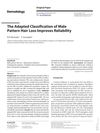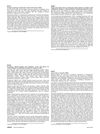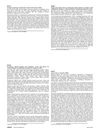 13 citations,
December 2017 in “Journal of Cosmetic and Laser Therapy”
13 citations,
December 2017 in “Journal of Cosmetic and Laser Therapy” Low-level laser therapy can stimulate hair growth more effectively than fake devices, but patient satisfaction is similar for both. Results should be taken with caution due to small study sizes and differences between studies. More research is needed.
 12 citations,
November 2020 in “Journal of Dermatological Science”
12 citations,
November 2020 in “Journal of Dermatological Science” Found microRNA differences in hair cells, suggesting potential treatment targets for hair loss.
 12 citations,
June 2020 in “Journal of The American Academy of Dermatology”
12 citations,
June 2020 in “Journal of The American Academy of Dermatology” Platelet-rich plasma is tolerable for lichen planopilaris and doesn't worsen the condition, but its effectiveness is unclear.
 7 citations,
October 2019 in “Evidence-based Complementary and Alternative Medicine”
7 citations,
October 2019 in “Evidence-based Complementary and Alternative Medicine” Chinese medicine may help hair growth and reduce hair loss in androgenetic alopecia.
 5 citations,
January 2021 in “Journal of Saudi Chemical Society”
5 citations,
January 2021 in “Journal of Saudi Chemical Society” Watercress oil may promote hair growth by activating specific receptors.
 5 citations,
January 2012 in “Dermatology”
5 citations,
January 2012 in “Dermatology” Adapted classification better assesses male pattern hair loss and its link to heart disease.
 4 citations,
January 2015 in “Journal of clinical & experimental dermatology research”
4 citations,
January 2015 in “Journal of clinical & experimental dermatology research” PRP injections may slightly improve hair density and count for male hair loss, but more research is needed.
 2 citations,
January 2018 in “Elsevier eBooks”
2 citations,
January 2018 in “Elsevier eBooks” Lipid nanoparticles improve drug delivery through the skin, offering stability, controlled release, and better compatibility with skin.
 1 citations,
May 2015 in “Journal of The American Academy of Dermatology”
1 citations,
May 2015 in “Journal of The American Academy of Dermatology” Both azathioprine and betamethasone treatments effectively regrow hair in alopecia areata, but azathioprine may be safer.

Baricitinib may effectively treat oral lichen planus.
 May 2015 in “Journal of The American Academy of Dermatology”
May 2015 in “Journal of The American Academy of Dermatology” Both treatments help with hair regrowth in alopecia areata, but azathioprine has milder side effects than betamethasone.
 May 2015 in “Journal of The American Academy of Dermatology”
May 2015 in “Journal of The American Academy of Dermatology” Both azathioprine and betamethasone treatments help with hair regrowth in alopecia areata, but azathioprine may have fewer side effects.
 April 2013 in “Journal of the American Academy of Dermatology”
April 2013 in “Journal of the American Academy of Dermatology” Diabetic patients often have ingrown nails due to obesity, high blood pressure, past injuries, bad nail trimming, nail fungus, weak foot pulse, and weak knee reflex.
 February 2013 in “Journal of the American Academy of Dermatology”
February 2013 in “Journal of the American Academy of Dermatology” Iron supplements may reverse premature hair graying caused by iron deficiency.
 August 2020 in “International Journal of Clinical Practice”
August 2020 in “International Journal of Clinical Practice” No link between hair loss and blood groups or Rhesus factor.
 February 2013 in “Journal of The American Academy of Dermatology”
February 2013 in “Journal of The American Academy of Dermatology” Finasteride solution helps treat hair loss.
April 2023 in “Journal of Investigative Dermatology” Low-dose spironolactone effectively treats female pattern hair loss with mild side effects.
1 citations,
July 2022 in “Clinical, Cosmetic and Investigational Dermatology” Taohong Siwu Decoction may help treat hair loss by targeting multiple genes and pathways.
April 2024 in “Tạp chí Y học Thảm hoạ và Bỏng” Choosing the right treatment for hair loss is complex and depends on effectiveness, side effects, practicality, and cost.
May 2023 in “Clinics in Plastic Surgery” Noninvasive treatments like PRP and laser therapy can effectively promote hair growth and reduce hair loss.
 1 citations,
March 2023 in “Frontiers in Medicine”
1 citations,
March 2023 in “Frontiers in Medicine” Topical prostaglandin analogs may help with hair growth but more research is needed.
 1 citations,
September 2021 in “Skin appendage disorders”
1 citations,
September 2021 in “Skin appendage disorders” Botulinum toxin injections can help treat common hair loss in men, but more research is needed to confirm this and understand how it works.
January 2022 in “Journal of Cosmetics, Dermatological Sciences and Applications” The serum increased hair density and was well-tolerated, but didn't affect hair thickness or shedding.
January 2022 in “Journal of Ayurveda case reports” Ayurvedic treatment significantly reduced hair loss and improved hair quality in a 30-year-old male.
3 citations,
September 2016 in “Clinical, cosmetic and investigational dermatology” Sphinganine can reduce hair loss and improve scalp health.
 1 citations,
January 2022 in “Skin appendage disorders”
1 citations,
January 2022 in “Skin appendage disorders” Hair shedding after childbirth can reveal a pre-existing condition of hair loss due to tight hairstyles.
Curcuma aeruginosa Roxb. may help treat hair loss by affecting specific biological pathways.
 June 2024 in “Computational and Structural Biotechnology Journal”
June 2024 in “Computational and Structural Biotechnology Journal” Multi-omics techniques help understand the molecular causes of androgenetic alopecia.
 February 2024 in “International Journal of Molecular Sciences”
February 2024 in “International Journal of Molecular Sciences” Hair loss in Androgenetic Alopecia is caused by genetics, aging, and lifestyle, leading to hair follicle shrinkage and related health risks.




















